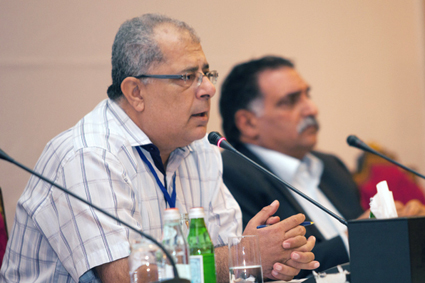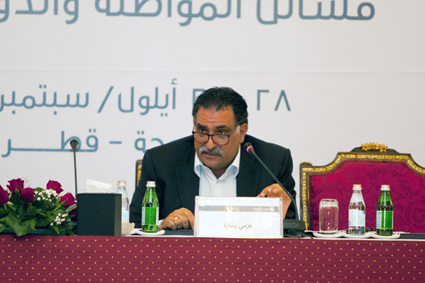Moroccan researcher on the fields of history and islamic political thought |
| Muhammad Jamal Barout welcomes the participants |
The Arab Center for Research and Policy Studies held its Second Annual Conference on “Islamic Political Movements and Democratic Governance” in Doha on September 28-29, 2013. This year’s conference focused on particular questions relating to citizenship, state, and nation, and was devoted to the discussion of around forty scholarly papers presented by specialist researchers.
Dr. Jamal Barout, one of the Center’s Senior Researcher opened the conference by observing that this year’s event follows on the success of last year’s conference “Islamic Movements and Democratic Governance,” noting that the conference strives to bring the perspective of scientific research to the assessment of the performance of Islamic political movements.
Dr. Azmi Bishara, General Director of the Arab Center for Research and Policy Studies delivered the conference’s opening address,
“The ‘Us’ and ‘Them’ and the Predicament of Democratic Culture in Times of Revolution”.
On Research Agendas
Studies on Islam and democracy have flourished over the last three decades. Entire research centers have made these topics their specialty. Often, such studies have been conducted and funded based on the agendas of Western academic institutions and research centers that are linked to Western political establishments and media institutions. The subject of Islam and democracy, however, has seldom been studied with an agenda of Arab democratic transition.
 |
| Azmi Bishara, Conference Opening Address |
In the Arab context, on the other hand, research on the matter has exclusively taken one of two paths: explaining the “Arab exceptionalism” in the midst of the global wave of democratization by making Islam responsible for its absence, or absolving Islam through theoretical explication of the essential compatibility between Islam and democracy. The entire question is fictive, however, as are the questions of “Christianity and democracy” and “Buddhism and democracy”. The “and” in these instances only creates the illusion of a relationship between these two terms.
Generally speaking, as scholars we have been expected to offer justifications and explain the reasons why a democratic transformation is not taking place in the Arab world. This must be one of those rare cases where the social sciences are expected to not only interpret a phenomenon, but also explain its absence; such an approach risks leading scholarly work astray, with academic research slipping toward fantastic and wild interpretation, with imaginative readings of “absence” and the “unseen” to explain why democracy or capitalism did not emerge in our countries. This is despite the fact that the social sciences hardly offer us the tools to explain why these phenomena emerged in Europe, let alone account for their absence in other regions.
On the whole, research has been pursued along lines that need re-thinking. The basic premise is that political culture is the main hurdle to democratic transition. This is normally only partially tested for validity, such as when “Islam” is seen to be synonymous with “political culture,” or is considered to be the key component thereof. Such investigations do not go beyond distinguishing between different Islamic political cultures based on the patterns of religiosity, class, and geographic distribution, on the one hand, and on the ideologies of Islamic movements, on the other—assuming that such research is objective and does not mix culture with permanent quasi-racial characteristics. A second premise is that political culture represents a decisive factor in democratic transition, while a third maintains that religion plays a bigger role than other ideologies in producing political culture. The final supposition states that Islamic political parties, like all ideological parties, are primarily religious movements before being ideological political parties, whether this is demonstrated by their vigorous upholding of ideals and principles, or by their expedient abandonment of those ideals and principles in practice.
It would be easy to statistically prove, through surveys and comparative sociological theory, that the difference in terms of popular political culture between the religious and the non-religious in our societies is negligible; the same applies, to a lesser extent, to the elites. It is also possible to theoretically show that if by “the effect of religion on political culture” we mean the impact of the historical religious legacy, this effect is not limited to the religious as it equally impacts non-religious individuals, affecting the culture of society as a whole. In On the Arab Question, I wrote that despotism in our region, whether religious or secular, is based on the same historical and cultural legacy, uses the same modern tools of rule, and undergoes the same interactions with other civilizations and societies.
I have no doubt that understanding cultural legacy is equally necessary for the religious and the secular because it affects both parties negatively and positively. By “negatively,” I am not just referring to negative effects, but also to negative connotations and reactions. By “positive,” I also do not just refer to positive effects, but also to the positive responses and reactions that alter the cultural tradition and re-interpret it by adopting it. Heritage only exists in the present. Heritage in its historical context is not heritage, but “present,” in its time. Equally, it can only exist in light of the present, and in light of the understanding of the contemporaries who invoke heritage and appeal to it. This process of understanding and perceiving constantly and radically alters the “original” form of heritage, as it is read and understood in a different historical context. Our conceptual tools are ones that did not hitherto exist, as with contemporary projections, interpretations, and desires. Thus, heritage exists when it is not an unchanging “heritage”; conversely, it is heritage when it does not exist as active discourse.
Based on the experience of the past few years, an extremely significant period considering the dynamics that have emerged within the great social transformations from one historical stage to another, it is easy to show that a society’s political culture was not an active factor that hampered democratic transition. Instead, political culture was more influenced than influential, particularly when the elites that opposed democratic transition (whether regional or local) preferred to mobilize people against their political opponents, rather than attempt to oppose them politically or establish a dialogue with political adversaries. The same applies to the competing parties in the respective Arab countries: in the midst of the struggles faced during the transitional phase, when there was a dire need for unity, many of the political and media elites sowed ignorance rather than enlightenment among the populace, speaking to their instincts rather than their rationality and spreading lies when necessary in order to mobilize the people against democratic transformation. In such a case, where does the responsibility lie? In the weakness of the democratic culture of the masses or in the anti-democratic culture of the elites?
The frail political culture of the popular base can always be exploited for mobilization against democratic principles, a natural phenomenon in societies that have no experience in democratic activism, nor the opportunity to assimilate democratic values or receive a real democratic education. The main responsibility, however, lies with those who mobilized segments of societies against these democratic principles, and who used ignorance as ammunition against their adversaries instead of shouldering the responsibility of democratic transition as a process of construction, which is at heart a national responsibility for all parties.
It is, therefore, my belief that problematic issues are taking on a new dimension; it is no longer necessary to distinguish the political culture of the religious from that of the non-religious, regardless of the usefulness of this distinction and its value for the purposes of scholarly research and the formulation of democratic policies. Instead, we should concentrate on the political culture of all existing movements and political parties, and the impact these cultures have on the popular bases of these political movements. It would be unjust (in the scholarly sense, “injustice” refers to the use of selective data that affirms our hypotheses, eclecticism in the methodology, the falsification of data, and hasty generalizations in induction) to limit our inquiry to the political culture of Islamic movements. The time has come to review the political culture of the Left, the Right, the nationalist movements, and those who are, justifiably or unjustifiably, labeled “liberals”.
Historically speaking, even classical liberals were not necessarily democrats in 19th-century Europe; what to say, then, of the neo-liberal claimants who ignore, or neglect, that this appellation has no value if its bearer did not defend civil liberties, knew nothing of liberalism and its origins and principles except for fanaticism for a specific lifestyle that has no relation to freedom and liberation, and who understands liberalism uniquely as opposition to religion, despite the fact that this enmity toward religion does not constitute one of the principles of liberalism or of its historical and theoretical origins?
Subsequently, we must investigate the main hurdles of democratic transition that have emerged in recent times and were identified prior to the Arab revolutions, including the bureaucratic apparatus of the state and its corruption, headed by the security apparatus and the interaction between the state apparatus with the regional oil and non-oil revenues, factors that are politically and culturally influential, particularly in weaving a sense of solidarity between anti-democratic reactionary states and social forces.